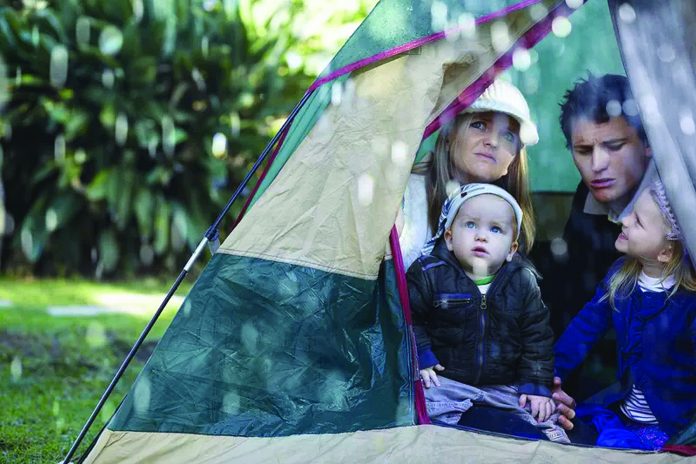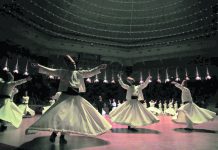My first camping experience was a damp and dismal one. I went on a school camping trip to northern France at the age of 14 and got thoroughly soaked. After we trouped around the D-Day beaches during the day in the rain, we all retired to our soggy little green tents and huddled together in a protective puddle as a torrential downpour reduced visibility to a few yards. Since then, whenever I read about the Normandy beaches, WW2 veterans or I watch The Longest Day movie on TV, I instinctively reach for my umbrella.
I underwent a second camping trial just a few years later when the whole family went to north Wales. I shared my father’s tent on a nearly perpendicular cliffside. When I say ‘tent’, I really mean a five-foot rectangular patch of old green canvas with lots of moth holes and a metre-wide rip along one side. It was my father’s old camping tent from the 1930s—an object of great nostalgia for him but not a thing of joyful anticipation for anyone else. It smelt of perished rubber, decomposed woodsmoke and damp under-cooked sausages with an over-riding odour of mould, paraffin and old socks. It was also missing about five tent pegs so we used steel barbeque skewers instead. The trouble with this is that they bend when you try to hammer them into solid mud which makes them incredibly uncomfortable when you end up lying on them at 2 am. However, my dad was very proud of his tent and took real pleasure from describing how his feet stuck out attractively at the end. He told me this was part of its clever design—healthy living with cold feet. He said it was a genuine antique and probably worth a lot of money at an old explorers’ auction, by which I think he meant an auction of ancient camping equipment rather than old men in duffel coats and snow masks. This was the real stuff—a tent from the golden age of camping when books like ‘With Scott in Antarctica’ or ‘Across Tibet by Yak and Husky’ were all the rage. If you went camping in those days, you were bound to be attacked by bears or tigers or wild Pathan tribesmen let alone minor discomforts like midges and tsetse flies. The 1930s were a time when boys had to prove themselves brave and sturdy enough to take on the wilds of nature and the elements. Camping was synonymous with survival and words like luxury and comfort had not yet been invented for life under canvas.
Anyway, I digress… Now back to sleeping on the side of a damp Welsh hill… My father kindly took the side facing downhill since his greater weight might act as a sort of book-end wedge to prevent both of us rolling down the precipice. This was fine with me, except my uphill side was the damaged side of the tent. The three-foot long hole ended just above my eyes so that when it rained (which it did most of the time of course), a river of water flowed down my hair and into my nose. We spent the longest three nights of my life on that hillside. I don’t think I slept more than five minutes during the whole time we were there.
As you can imagine, these two adventures made me swear never to go camping again. Others may extol the beauties of the wild outdoors, the fresh air and the joy of being at one with Nature, but I would rather take a ‘rain-check’—literally. How surprising it was therefore to see our garden full of tents last month. This did not include me of course, but my two sons and their families had decided that the only way we could spend a fortnight together on holiday was for them to camp out in our garden. Very clever really… the fear of Coronavirus and enforced self-isolation meant that nobody could actually sleep in our house, so we all ate our meals at opposite ends of the dining room table (luckily just over 2 metres long) before they retired for the night to their canvas home while my wife and I slept peacefully upstairs. This all worked surprisingly well—mainly due to the expert camping skill of my sons and the huge advance in tent technology. Yes, gone are the old days of ripped green canvas, the smell of damp underwear and leaky tarpaulins. Their new tent is now a model home with all mod cons. For a start, it is huge—it’s more of a small castle bungalow than a mere tent and everyone even has their own room (or ‘pod’) to sleep in! Such luxury! The whole thing is pristine and efficient and when it rains (which it always will when camping) you can keep dry and even stand up in its snuggly warmth inside. No more crouching under damp and rain-soaked fabric being scared to touch the sides or the water will come flooding in. This is the Buckingham Palace of tents.
My father would have hated it. “Too nice”, he would have scoffed. “Too namby-pamby, too dry, too comfortable! Might just as well sleep at home!” But I secretly rather wish we could have had one just like that on the side of a Welsh mountain…










